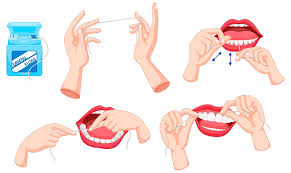
Daily use of an interdental cleaner (floss) is essential to maintaining healthy teeth and gums. When some questioned the value of flossing a couple of years ago, dental professionals and the U.S. Government quickly reaffirmed its importance. There are places between your teeth that toothbrushes cannot reach, and they need to be cleaned daily. Flossing helps to remove bacteria-laden plaque that can turn into tartar. When tartar builds up along your gumline, it can lead to periodontal disease.
The staff at Farber Center are among dental and periodontal professionals who wholeheartedly recommend their patients floss daily — along with brushing at least twice a day. Together, these are the essential elements of dental hygiene that maintain your oral health and contribute significantly to better whole-body health. Among Long Island’s holistic dentists, Farber Center is a firm advocate of dental health education and advanced preventive care, including flossing.
Do I Really Need to Floss Every Day?
 The answer is yes — and for many good reasons. Although twice-daily brushing is the essential activity, it can’t quite reach everywhere around your teeth and gums. That’s why floss, known formally as an interdental cleaner, is so crucial. You might feel a need to floss when a small bit of food s stuck between your teeth, but it’s what you can’t feel that is the most important reason. Brushing twice a day can only reach so far in your mouth. Accumulated plaque can contain as many as 500 types of bacteria, many of which can lead to tooth decay and gum disease. Plaque between your teeth that is not removed can harden and turn into tartar (or calculus). Once plaque turns into tartar, only a dentist or hygienist can remove it.
The answer is yes — and for many good reasons. Although twice-daily brushing is the essential activity, it can’t quite reach everywhere around your teeth and gums. That’s why floss, known formally as an interdental cleaner, is so crucial. You might feel a need to floss when a small bit of food s stuck between your teeth, but it’s what you can’t feel that is the most important reason. Brushing twice a day can only reach so far in your mouth. Accumulated plaque can contain as many as 500 types of bacteria, many of which can lead to tooth decay and gum disease. Plaque between your teeth that is not removed can harden and turn into tartar (or calculus). Once plaque turns into tartar, only a dentist or hygienist can remove it.
Daily flossing keeps the spaces between your teeth cleaner and free from plaque. When done frequently and correctly, it also can help clean along the gum line, which is so important to your gums. Periodontal disease caused by plaque and tartar is mostly preventable with good oral hygiene and regular visits to a dentist for professional dental cleanings and check-ups. Over the long term, you’ll save hundreds and thousands in dental bills when your teeth are free from decay, and your gums stay healthy. Eating well and reducing sugary foods also helps, and when combined with excellent oral hygiene practices, your chances of avoiding tooth decay and periodontal disease increase exponentially.
If I’m Not Flossing Already, How Do I Begin?
 When you first introduce flossing into your daily oral hygiene routine, it may cause mild discomfort. But it should ease within a week or two. If discomfort or bleeding continues, talk to your dentist because it may be a sign of gum disease. Also, maximize the value of your daily flossing routine by using an optimal technique. All of the Farber Center dental hygienists are pleased to give you tips, pointers, and information. They have patient education materials and can direct you to video demonstrations available from professional organizations such as the American Dental Association. Make sure you floss thoroughly and reach all areas. The more plaque and trapped food particles you remove each time, the more you are helping yourself in the long run.
When you first introduce flossing into your daily oral hygiene routine, it may cause mild discomfort. But it should ease within a week or two. If discomfort or bleeding continues, talk to your dentist because it may be a sign of gum disease. Also, maximize the value of your daily flossing routine by using an optimal technique. All of the Farber Center dental hygienists are pleased to give you tips, pointers, and information. They have patient education materials and can direct you to video demonstrations available from professional organizations such as the American Dental Association. Make sure you floss thoroughly and reach all areas. The more plaque and trapped food particles you remove each time, the more you are helping yourself in the long run.
By flossing and brushing your teeth regularly, as recommended, as well as having regular dental and periodontal check-ups, you are doing all you can to prevent gum disease and tooth decay. Flossing takes very little time and effort and can quickly form part of your daily dental hygiene regimen. An extra couple of minutes a day will be well worth it when you don’t need to go through the discomfort, inconvenience, and expense of fillings, dental implants, periodontal treatments, or tooth extractions.
Comments are closed.
